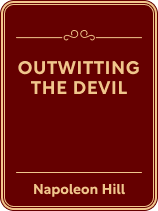

This article is an excerpt from the Shortform book guide to "Outwitting the Devil" by Napoleon Hill. Shortform has the world's best summaries and analyses of books you should be reading.
Like this article? Sign up for a free trial here .
Do you know how the law of attraction works? Do you believe in it?
Wildly popular, often misunderstood, and sometimes ridiculed, the law of attraction is a feature in much of the self-help literature over the past century. Napoleon Hill, who popularized the law in his books, explains that it’s simply the notion that “like attracts like.” That’s why he stresses the importance of positive thinking.
Keep reading for Hill’s discussion of the law of attraction.
The Law of Attraction
The law of attraction proposes that thinking positive thoughts will attract success while thinking negative thoughts will lead to failure. It suggests that “like attracts like,” and so the first step towards achieving success is to believe that success will come.
In Hill’s discussion of how the law of attraction works, he does not go so far as to say that all failure is the result of negative thinking—he acknowledges that people are born into very different circumstances and with various social advantages or disadvantages. However, he still insists that there is no such thing as luck and that, if you have a clear goal you’re determined to achieve, you fully believe that you’re capable of achieving it, and you insist on thinking positively about what you’re doing, you will eventually find success.
Hill also argues that the law of attraction can act as a guide in prayer. He believes that anyone who prays while doubting that their prayer will be answered has guaranteed that that’s exactly what will happen. Absolute faith in both yourself and in a higher power is necessary for prayers to be effective. You should also pray regularly, and pray to express gratitude as much as you pray to ask for things. Finally, be prepared to take initiative and make sacrifices in order for your prayers to be realized, making the act of praying into more of a request for help or God’s blessing than for a miracle.
| Criticisms of the Law of Attraction The law of attraction is a cornerstone of New Thought and shows up in nearly all of Hill’s writings. It’s also one of the most misunderstood of New Thought beliefs and the most ridiculed by critics. After the documentary film version of Rhonda Byrne’s The Secret was released in 2006, many bloggers tested its theories by praying for material goods and waiting for them to arrive. However, the law of attraction is not about wishing for something, such as a new desk, and expecting that it will come to you with no effort on your part. Rather, it argues that pursuing a goal with absolute confidence that you will succeed, and that God or a higher power has heard your desire and is supporting you in achieving it, makes it more likely that you will succeed. Even if you yourself are not religious, there’s no denying that greater self-confidence leads to greater success, if for no other reason than that it makes you more empowered to ask for what you want. There are still valid criticisms to be made of the theory of the law of attraction (for example, Mark Manson claims that it’s little more than confirmation bias encouraging you to see God’s will in what might be random coincidence, and rejects “absolute faith” as a form of “delusional positive thinking” that will only distract you from your real obstacles), but these overly literal readings misrepresent New Thought ideas. |

———End of Preview———
Like what you just read? Read the rest of the world's best book summary and analysis of Napoleon Hill's "Outwitting the Devil" at Shortform .
Here's what you'll find in our full Outwitting the Devil summary :
- How failure and bad habits keep people from reaching their potential
- How to escape the Devil’s influence and avoid being turned toward inaction
- How to find your way to professional and financial success






